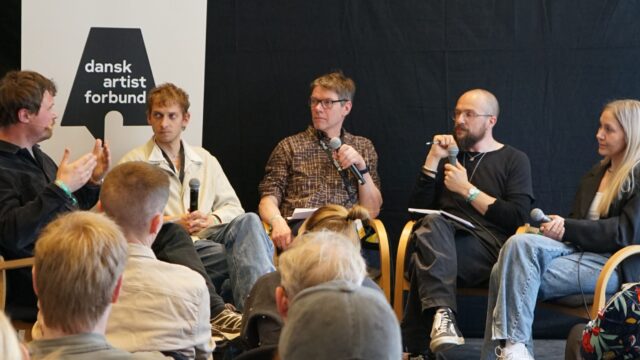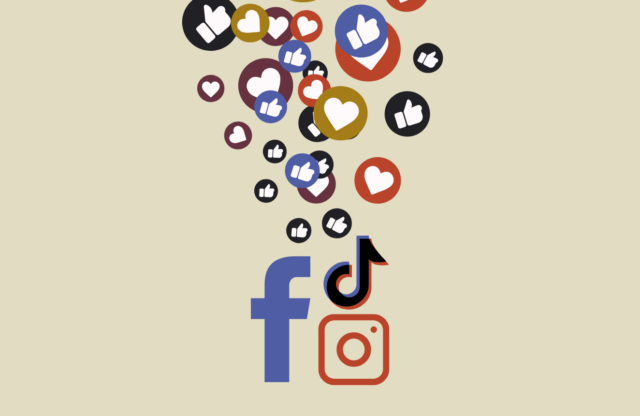Expert:
Social media is the artist's digital stage
Søren Pold, PhD and Associate Professor at Aarhus University and expert in platform economics and digital culture, researches how technology and platforms affect cultural life.
According to Pold, the development must be understood in a broader societal context: social media emerged alongside smartphones and streaming platforms as part of a larger technological revolution. Social media and digital presence have become a kind of uncontrollable digital stage. And control over it is falling apart more and more," he says, adding:
"It's important to remember that platforms edit and limit who we reach. You rarely reach the people you're actually trying to reach, and this is related to the fact that social media is becoming even more re-commercialised as time goes by. What you post is never the primary product of the service," says Søren Pold.
Hans therefore believes that artists should relate to the platforms as a kind of digital stage that it is important to consider how to be present on.
The digital scene as part of artistic expression
According to Pold, it's part of a new reality that artists must see social media as part of their 'scene' and consider how they portray themselves in relation to their audience.
"If there is a connection between the music, stage performance and the way you are present on the platforms, it can become part of the artistic expression. You can be welcoming, open dialogues, respond to comments, be vulnerable or activist," he says.
He also mentions the link between the physical and the digital as something that often works:
"Many musicians organise events at record stores or concerts, which they combine with online posts and interactions. It works. If you've been to a concert, you typically want to share photos and write that it was great - and it's even better if the artist responds. It makes you feel heard."

Danish Artist Association industry debate on social media at SPOT+ 2025 with Søren Pold (centre), Nickals Sahl - artist and songwriter, Kristoffer Rom - Tambourhinoceros and Charlotte Madsen - Universal Music and Capitol Records, Jens Skov Thomsen - Danish Artist Association.
Platforms are becoming more commercial - and more opaque
Pold believes that we are in a digital reality where things have become more raw - with increased advertising-driven structures and increasing pressure on artists.
"You make a little money from streaming, and social media is increasingly driven by advertising and commercialisation. And then in recent years we can also start talking about Trump and the darker sides of the platforms - from a European prism at least," he says.
The platforms' terms of use are also criticised by artists and musicians in the Danish Artist Association Survey on working conditions on social media.
The opaque algorithms are a major source of frustration. They describe that it's hard to understand why some content gets a wide reach and others disappear.
The same goes for the business model on which the platforms are built. The artists and musicians surveyed find that their posts reach fewer people than expected and that it's impossible to know who the content is actually being shown to.
Social platforms are a working condition
At the same time, technological development has brought great benefits that also benefit artists in terms of reaching larger audiences and making it easier and cheaper to produce and release music, especially for some genres. But there is no doubt that earning opportunities have weakened, according to Pold.
The Danish Artist Association's survey clearly shows that social media has become a working condition. Therefore, it is also important to talk about the imbalance in the digital economy, which also leads to an unequal power relationship between services and consumers, according to Søren Pold:
"The culture industry and record labels have always been controversial in terms of their role in commercialising artists and art, but it's very clear that the 'contract' has become even more unequal than before after the advent of Big Tech and streaming. It's easier to get started, but harder to make a living from it."
Paid visibility can be counterproductive
In the digital reality, it's important to consider how to use social media for marketing and branding: Platforms like Facebook and Instagram offer artists to pay for increased reach, but according to the researcher, this is not necessarily effective - in some cases it can even have the opposite effect:
"Recent research shows that we actually don't like to see targeted posts where someone has paid for visibility. It can cause a backlash. If you feel too targeted, you react negatively."
Half of the musicians in the Danish Artist Association's survey point to the platforms' opaque algorithms as a major frustration. It's hard to understand why some content reaches a wide audience while others disappear in the crowd.
"It certainly seems to be getting harder and harder for the individual to figure out. The platforms control the distribution, and they have an interest in keeping it a bit opaque," says Søren Pold.
You can read more about the Danish Artist Association's survey here and stay tuned to the newsletter for more articles on how to approach social media as your digital stage.
Focus on social media as working conditions
A survey in spring 2025 shows a consistent picture of pressure on the artist for presence in the form of work and digital performance - with no guarantee that it will pay off.
Key findings of the survey:
- Seven out of ten artists report spending over an hour a day on social media in a professional context.
- None of the respondents see it as realistic, at this point in time, to completely or partially withdraw from social media if you want to have a professional career as an artist.
- All the artists interviewed confirm that they are ultimately the ones at the keyboard when it comes to communicating with their followers.
- Five out of ten have occasionally received assistance with planning or designing specific adverts, but the help is limited and often temporary.
- None of the respondents are paid directly for the time they spend on social media.
- All participants mention that they have experienced pressure from record labels, management or venues to post more, more often or in a certain way.
- A third say they've posted content that they later regretted and have since deleted.
- Half point to the platforms' opaque algorithms as a major frustration.
- Similarly, half of the artists point out that being active on social media requires mental energy.
Text: Trade journalist Mathias Krogsøe
Editor: Dorthe Vincentzen


